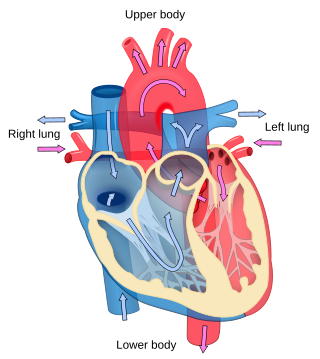
Cardiology is the study of the heart. Cardiology is a branch of medicine that deals with disorders of the heart and the cardiovascular system. The field includes medical diagnosis and treatment of congenital heart defects, coronary artery disease, heart failure, valvular heart disease, and electrophysiology. Physicians who specialize in this field of medicine are called cardiologists, a sub-specialty of internal medicine. Pediatric cardiologists are pediatricians who specialize in cardiology. Physicians who specialize in cardiac surgery are called cardiothoracic surgeons or cardiac surgeons, a specialty of general surgery.
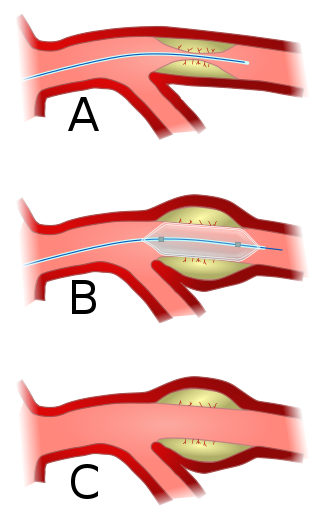
Angioplasty, also known as balloon angioplasty and percutaneous transluminal angioplasty (PTA), is a minimally invasive endovascular procedure used to widen narrowed or obstructed arteries or veins, typically to treat arterial atherosclerosis.
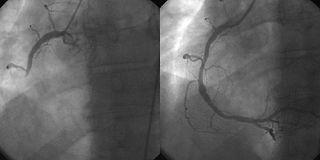
Interventional cardiology is a branch of cardiology that deals specifically with the catheter based treatment of structural heart diseases. Andreas Gruentzig is considered the father of interventional cardiology after the development of angioplasty by interventional radiologist Charles Dotter.
Andreas Roland Grüntzig was a German radiologist and cardiologist, with foundational interest, training and research in epidemiology and angiology. He is known for being the first to develop successful balloon angioplasty for expanding lumens of narrowed arteries. He was born in Dresden.

A catheterization laboratory, commonly referred to as a cath lab, is an examination room in a hospital or clinic with diagnostic imaging equipment used to visualize the arteries of the heart and the chambers of the heart and treat any stenosis or abnormality found.

Percutaneous coronary intervention (PCI) is a minimally invasive non-surgical procedure used to treat narrowing of the coronary arteries of the heart found in coronary artery disease. The procedure is used to place and deploy coronary stents, a permanent wire-meshed tube, to open narrowed coronary arteries. PCI is considered 'non-surgical' as it uses a small hole in a peripheral artery (leg/arm) to gain access to the arterial system, an equivalent surgical procedure would involve the opening of the chest wall to gain access to the heart area. The term 'coronary angioplasty with stent' is synonymous with PCI. The procedure visualises the blood vessels via fluoroscopic imaging and contrast dyes. PCI is performed by an interventional cardiologists in a catheterization laboratory setting.

A drug-eluting stent (DES) is a tube made of a mesh-like material used to treat narrowed arteries in medical procedures both mechanically and pharmacologically. A DES is inserted into a narrowed artery using a delivery catheter usually inserted through a larger artery in the groin or wrist. The stent assembly has the DES mechanism attached towards the front of the stent, and usually is composed of the collapsed stent over a collapsed polymeric balloon mechanism, the balloon mechanism is inflated and used to expand the meshed stent once in position. The stent expands, embedding into the occluded artery wall, keeping the artery open, thereby improving blood flow. The mesh design allows for stent expansion and also for new healthy vessel endothelial cells to grow through and around it, securing it in place.
Sri Jayadeva Institute of Cardiovascular Sciences and Research (SJICR) is a tertiary care autonomous healthcare institute run by the Government of Karnataka, in Bangalore, with additional centers in Mysore and Gulbarga. At the Bangalore campus, it presently has 1150 in-patient beds for cardiology, cardiothoracic surgery and pediatric cardiology, spread over two twin eight story buildings and is considered one of the largest dedicated heart hospitals in Asia. This new building which was opened in 2001 and was built at a cost of US$17 million.
The history of invasive and interventional cardiology is complex, with multiple groups working independently on similar technologies. Invasive and interventional cardiology is currently closely associated with cardiologists, though the development and most of its early research and procedures were performed by diagnostic and interventional radiologists.
Lourdes Heart Institute and Neuro Centre (LHINC) is a new block set up in Lourdes Hospital, Cochin, Kerala, India, to cater to tertiary level care for the entire spectrum of cardiovascular and neurological disease. It was inaugurated on 16 March 2007, by Mr. A. K. Antony, the Defence Minister of India. This institute was started to meet a long-felt need to provide cardiac and neurological interventional facilities, and especially to provide interventional neurological facilities for the treatment of strokes, including selective thrombolysis and primary angioplasty for stroke which was hitherto unavailable in this part of India.

A coronary stent is a tube-shaped device placed in the coronary arteries that supply blood to the heart, to keep the arteries open in patients suffering from coronary heart disease. The vast majority of stents used in modern interventional cardiology are drug-eluting stents (DES). They are used in a medical procedure called percutaneous coronary intervention (PCI). Coronary stents are divided into two broad types: drug-eluting and bare metal stents. As of 2023, drug-eluting stents were used in more than 90% of all PCI procedures. Stents reduce angina and have been shown to improve survival and decrease adverse events after a patient has suffered a heart attack—medically termed an acute myocardial infarction.
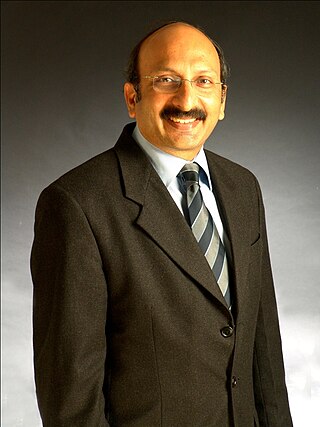
Dr. Praveen Chandra is an Indian cardiologist and chairman of interventional cardiology at Medanta - The Medicity, Gurgaon, India. He is recognised as one of the leaders in angioplasty in the country and is proficient in a lot of new devices and technologies. He has been awarded for his contribution and services in the field of coronary angioplasty in India in 1998.

Dr Purshotam Lal is an Indian Interventional cardiologist who has to his credit the pioneering of over 20 interventional cardiology procedures for the first time in India, some of which were the first time in the World. Trained in UK, US and Germany, and he has held various faculty positions including Professor, Advisor, etc.
Mathew Samuel Kalarickal is an Indian cardiologist widely known as the father of angioplasty in India. He specializes in coronary angioplasty, carotid stenting, coronary stenting and rotablator atherectomy.
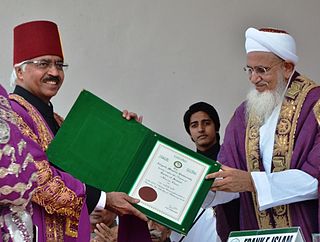
Ashok Seth is an Indian interventional cardiologist, credited with the performance of over 50,000 angiograms and 20,000 angioplasties, which has been included in the Limca Book of Records, a book for achievements and records from an Indian perspective. He is a Fellow of the Royal Colleges of Physicians of London, Edinburgh and Ireland and serves as the chief cardiologist, holding the chairs of the department of cardiovascular sciences and cardiology council at the Fortis Healthcare. Seth, a recipient of the Order of Isabella the Catholic, was honored by the Government of India with the fourth highest Indian civilian award of Padma Shri, in 2003, followed by Padma Bhushan, the third highest Indian civilian award, in 2015.

Tejas M. Patel is a cardiologist from Ahmedabad, India and chairman and chief interventional cardiologist at Apex Heart Institute, Ahmedabad. Patel, who has received the Dr. B. C. Roy Award, the highest Indian medical award, was honoured by the Government of India in 2015 with the Padma Shri, the fourth-highest Indian civilian award. In 2024, he was further recognized with the Padma Bhushan, the third-highest civilian award of the Republic of India, for his outstanding contributions to cardiology.
Suvro Banerjee is a consultant interventional cardiologist, practicing in Kolkata. He has worked at various hospitals in the United Kingdom, and is a Fellow of the Royal College of Physicians of London as well as Edinburgh. His procedural skills, among others, include coronary and peripheral angioplasty, pacemaker, ICD and CRT implantation. He is the first doctor in Kolkata to successfully use the ICD which is the Implantable Carvioverter Defibrillatorto to treat a patient's abnormal heart rhythm.
National Institute of Cardiovascular Diseases (NICVD); (Urdu: نيشنل انسٹيٹيوٹ آف كارڈيو ويسكيولر ڈيزيزز) in collaboration with the Government of Sindh are a chain of health care centres located in Sindh, Pakistan.

Samin K. Sharma is an American philanthropist of Indian descent and an interventional cardiologist who co-founded the Eternal Heart Care Centre and Research Institute in Jaipur (EHCC). Sharma has served on New York State’s Cardiac Advisory Board since 2004. As of 2021, he is Senior Vice-President, Operations & Quality at The Mount Sinai Hospital in New York and runs the Dr. Samin K. Sharma Family Foundation Cardiac Catheterization Laboratory. As of 2018, he is Chairman Board of Trustees, Association of Indians in America (AIA). As of 2022, he has been an investigator on 86 grants and multi-center trials and authored 486 peer-reviewed articles that have been cited 21,734 times.
Iraj Nazeri is an Iranian cardiologist and professor at Tehran University of Medical Sciences. He performed the first coronary angioplasty in Iran.











